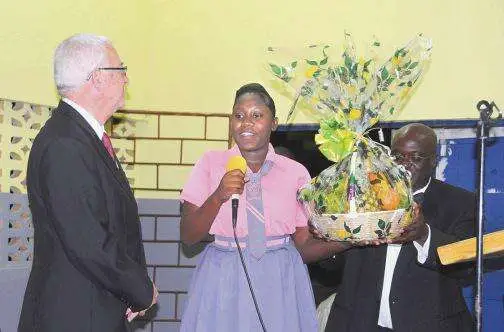
Cross Keys High ‘sell off’
MANDEVILLLE, Manchester—The sumptuous meal prepared and served by the Cross Keys High School home economics department probably had something to do with it.
Indeed, the sweet potato salad brought murmurs of delight from every table.
But the upbeat mood at the recent formal launch of the Cross Keys High School Caleb and Barbara Walters Scholarship Fund had more to do with pride in a school which has seen bad times but is now growing in stature by leaps and bounds.
“Cross Keys High, yu sell off!” declared an enthused Education Minister Ronnie Thwaites to prolonged applause and laughter.
As explained by Ralph Nelson, principal of Cross Keys High, the scholarship fund has come about as a result of a recognition that a growing number of high achieving graduates are missing out on a tertiary education, because of being poor.
“We couldn’t wait any longer,” Nelson told his audience. “We have been toying with the idea … how can we help these students given the socio-economic conditions of the community, we cannot allow that to be an excuse for our young people not to excel”, he said.
Initially, the fund — which is named in honour of founding principal of the 30-year-old south Manchester school, Caleb Walters and his wife Barbara — will have a target of $300,000 in its first year, starting with the next September term. It will seek to provide one year of tuition for students gaining entry to tertiary institutions found to be in greatest need. In addition there will be a crisis fund to assist others at universities and colleges.
Nelson said the intention was to get beneficiaries started. “I have told them I want them to get their feet inside the door (at tertiary institution)… once they smell the coffee, they will want to finish,” he said.
The principal said a special committee of the fund would help students research scholarships and academic funding which, he said are available “but often students find out about them too late”.
The fund will be supported by the Manchester business community as well as fund-raising efforts. Donations from several companies were read out at the recent function.
A further boost came when Thwaites pledged that his Ministry will match “whatever sum you are able to gather” up to $300,000 for the academic year starting next September.
“We (the ministry of education) could do no less” given the efforts by teachers and administrators at Cross Keys High, said Thwaites.
Recalling that back in 2011, Cross Keys High was at a low ebb following the stabbing death of a student there, Thwaites commended the school for “picking yourself up and pressing ahead”.
He urged the school’s administration to share their experiences and lessons with other schools who have had to deal with trauma and underachievement, so they too can start the road to recovery.
Noting that Cross Keys High has a reputation for skills training, Thwaites urged the school to “keep going with those trade options”.
Even as he applauded the school for improved academic standards, Thwaites charged that practical skills training be encouraged and expanded to meet the needs of a rapidly changing global economy.
Thwaites who declared the need for a “language change” from talk of ‘traditional’ and ‘non-traditional’ schools, noted that many of the “newer, fresher high schools are doing as well or better than many (older schools) and many are doing better in new subjects and areas that are very important to the livelihood of students and the growth of the nation”.
And in reference to the quality of the potato salad, Thwaites said it was a reminder that farmers should be encouraged to grow local produce for schools. Not only would it improve students’ nutrition, it would save foreign exchange, he said.
Giving background to the Caleb and Barbara Walters Scholarship Fund, Nelson and other members of the teaching staff at Cross Keys High, told about students who had excelled but lacked the parental and economic support to attend universities and colleges.
Teachers were often called on to dip into their pockets, they said. They spoke of students at the Bethlehem Teachers College and the GC Foster College who have benefitted from the support of teachers.
Tracing the progress of the school, Nelson said there was a time a few years ago when the school fraternity suffered from extreme depression because only the poorest academic performers at age 11 and 12 were sent to Cross Keys High.
“The students knew it, the teachers knew it, when they (students) were placed at Cross Keys High School it was because there was nowhere else they could fit,” said Nelson.
There came a time when the teaching staff decided enough was enough. The time had come to change their methods and adjust the curriculum to meet the needs of their students.
“We came together as a staff and decided that this must change,” said Nelson. “We not going to quarrel with the students that are placed here but we are going to work with them. We begun to put things in place, we reviewed our curriculum and how it was offered and we started the ball a-rolling,” he said.
Current academic results were a reward for effort, Nelson said.
“Today we have students passing eight subjects with ones and one thing I am very happy for, these are coming from the local primary schools… up to [the] last CXC results, the comment was that the students from Cross Keys High were performing the best from their communities…,” he said.
He spoke feelingly of “a young man … who got eight subjects, seven ones, at Cross Keys High School. His teacher at the primary school said ‘and fancy he was in the dunce class’.”
The lesson to be learnt, said Nelson, was that “it is not where they are coming from… we have the programme at Cross Keys High School to help good students make it, if they want to…”





























